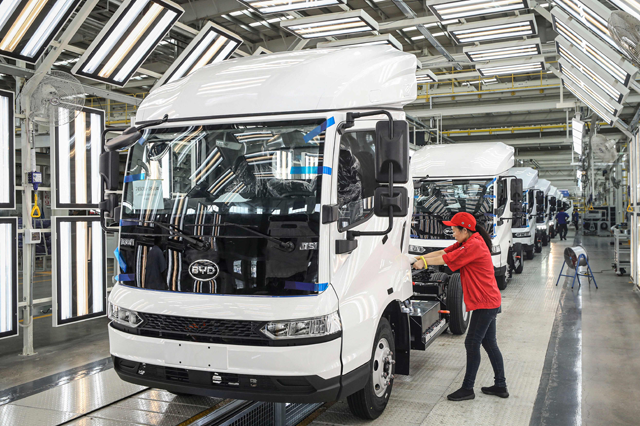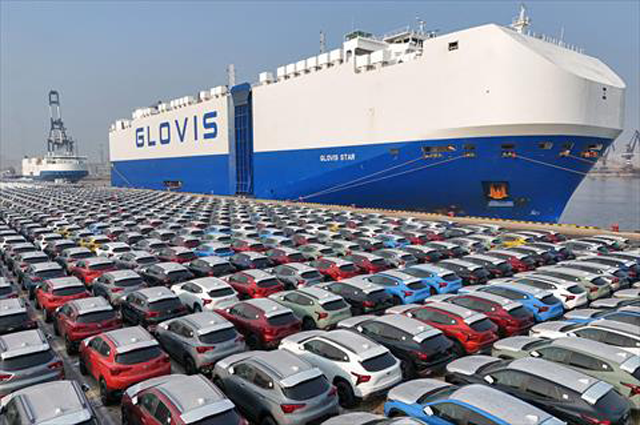You are here
China's BYD opens EV plant in Thailand despite slowdown, tariff row
By AFP - Jul 05,2024 - Last updated at Jul 05,2024

The BYD logo is seen on the BYD stand at the Beijing Auto Show in Beijing on May 3 (AFP photo)
BANGKOK — China's electric vehi¬cle giant BYD opened a factory in Thailand on Thursday, continuing its international expansion despite a market slow¬down and hours before the European Union was due to impose swinge¬ing tariffs on Chinese EV firms.
The plant in Rayong, an industrial area south¬east of Bangkok, will be able to build up to 150,000 vehicles a year, according to the compa¬ny, which dominates its domestic market.
Wang Chuanfu, Shen¬zhen-based BYD's chief executive, said produc¬tion would initially fo¬cus on full electric vehi¬cles and later expand to include plug-in hybrids, which combine a con¬ventional engine with an electric motor.
"BYD Thailand plant has an annual capacity of 150,000 vehicles, in¬cluding the four major processes of vehicle and parts production, and will create about 10,000 jobs," Wang said at an opening ceremony.
The move comes as Thailand seeks to shift its longstanding auto sector away from con¬ventional vehicles and towards EV production.
BYD overtook Elon Musk's Tesla in the fourth quarter of 2023 to become the world's top seller of electric vehicles.
Tesla reclaimed top spot in the first quarter of this year, but BYD is bullish about its ex¬pansion, insisting last month it would press ahead with a second fac¬tory in the EU.
The Chinese automak¬er recorded a record an¬nual profit of 30 billion yuan ($4.1 billion) last year, but in April report¬ed lower than expected revenue for the first quarter of 2024.
BYD has faced a bit¬ter price war in China, where a staggering 129 EV brands are slugging it out — with only 20 achieving a domestic market share of one per cent or more, according to Bloomberg.
China has led the global shift to electric vehicles, with almost one in three cars on its roads set to be electric by 2030, according to the International Energy Agency's annual Global EV Outlook.
But European regu¬lators have raised con¬cerns about what they say is "overcapacity" created by excessive state subsidies.
Seeking to protect Eu¬ropean manufacturers from cheaper Chinese imports, Brussels has proposed a provisional hike of tariffs on Chi¬nese manufacturers: 17.4 per cent for BYD, 20 per cent for Geely and 38.1 per cent for SAIC — in addition to the cur¬rent 10 per cent import duty.
EU and Chinese trade chiefs held talks last weekend in a bid to avert a bitter trade war, but the tariffs are set to come into force on Thursday.
But while they are high, the EU tariffs are significantly lower than the 100 per cent rate the United States imposed from last month on Chi¬nese electric cars.
Related Articles
ISTANBUL — China's electric vehicle (EV) giant BYD on Monday signed an agreement with Turkey to open a plant in the country in a move that w
BEIJING — Leading Chinese automaker BYD posted on Wednesday a 24.4 per cent rise in net profit for the first half of 2024, boosted by contin
TOKYO — China's global dominance in electric cars helped it overtake Japan as the world's biggest vehicle exporter last year, official data

















